PC Resurgent
The PC market turnaround is real. ~ Bob O’Donnell (@bobodtech) 10/15/14
Q: IS THE PC MARKET TURNAROUND REAL?
A: No.
Macs are resurgent. Google Chrome is slowly gaining ground. However, sales of traditional personal notebook and desktop computers that run the Windows Operating System and are known as “PCs”, continue to falter.

In the second quarter of 2014, Apple’s Mac sales grew by 18% while overall PC sales declined by 1%.
In the third quarter of 2014, Apple’s Mac sales grew by 21% while overall PC sales declined by 1.7%.
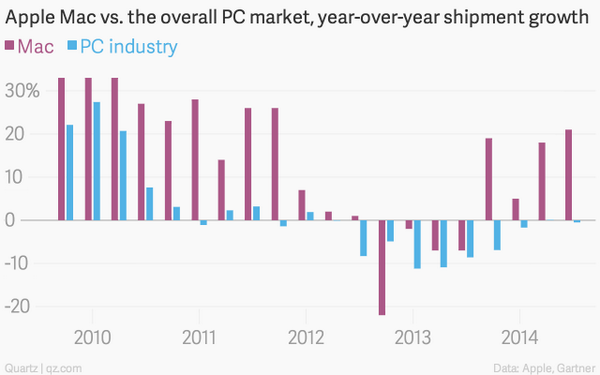
On the other hand according to NPD, PCs went from 75% share to 68% in two years.

Source: “PC market still shrinking, with smaller firms squeezed out“, Charles Arthur
Conflating Apple’s Mac, Google’s Chrome, and Windows powered PCs conceals, rather than reveals, what is happening in the personal computing category. PCs were expected to get a big bump in sales from the end of life of Windows XP. A bump occurred, but it hasn’t signified a recovery, it has only slowed the PC’s decline.
PC Dead
So you believe the Windows PC is dead? ~ Oren Kaufman (@HorhayAtAMD) 10/20/14
PCs dead? I think not…when are people going to finally wake up? ~ Bob O’Donnell (@bobodtech)
Q: IS THE PC DEAD?
No.
No reasonable, rational observer of the tech marketplace is claiming the PC is dead. That’s a straw man — an exaggerated depiction of an opposing argument easily disproven. However, there is nothing unreasonable or irrational in asserting the PC will never again regain its once preeminent position in computing. In 2006, the PC dominated computing with around 95% market share. Today, the PC is but one of three branches of computing and, in terms of market share, it is rapidly becoming the lessor of the three.
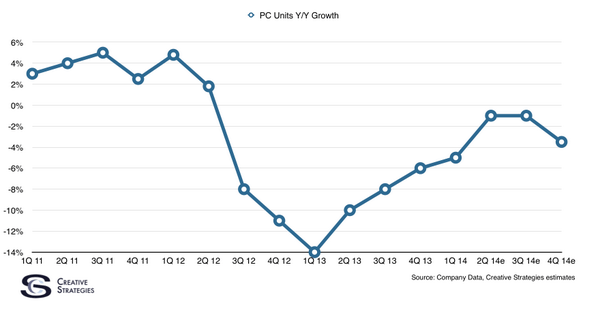
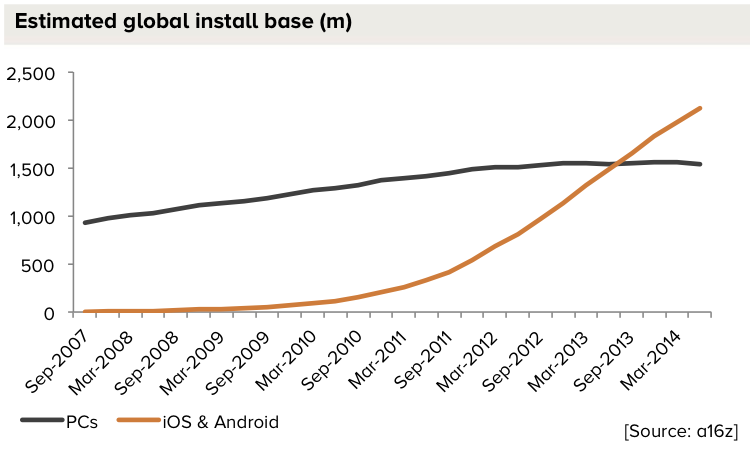
Macs Resurgent
(T)his is claim chowder for those claiming death of PC form factor. ~ Oren Kaufman (@HorhayAtAMD) 10/20/14
Q: DO INCREASED MAC SALES REFUTE CLAIMS THE PC HAS LOST PREEMINENCE?
A: No.
Mac sales are up, but they are not increasing overall desktop and notebook sales. Instead, Mac sales seem to be displacing PC sales. Despite the increased Mac sales, notebooks and desktops as a whole continue to decline.

iPads
Windows 8 launched during a time when lots of people said that tablets would kill the PC. Does anyone still think that? ~ Harry McCracken (@harrymccracken) 9/30/14
Looks like AAPL made more money on PCs than tablets. What was that about the PC being dead again? ~ Bob O’Donnell (@bobodtech)
Q: DO INCREASED MAC SALES REFUTE CLAIMS IPADS/TABLETS HAVE SIGNIFICANTLY IMPACTED PC SALES?
No.
We have to keep things in perspective. PC sales are mildly declining. Smartphone sales are rapidly growing. Tablet sales are flat, but they still easily outsell PCs.
There are now close to twice as many iPads as Macs in use. ~ Benedict Evans (@BenedictEvans) 9/22/14
Just think about that for a second. Macs have been around for 30 years. iPads have been around for 4 years. Yet already, there are twice as many iPads in use as there are Macs.
Despite the Mac’s recent surge and the iPad’s stalled growth, iPads easily outsell Macs and the iPad’s base is therefore growing much faster. Just look at the sales numbers. In the third quarter of 2014, Apple sold 39.3 million iPhones. They sold 12.3 million iPads. And, in a record breaking quarter, Apple sold 5.5 million Macs. That means the much criticized iPad is outselling Macs by more than 2-to-1 and iPhones are outselling Macs by more than 5-to-1. The surging Mac is not catching up. It’s falling further and further behind.
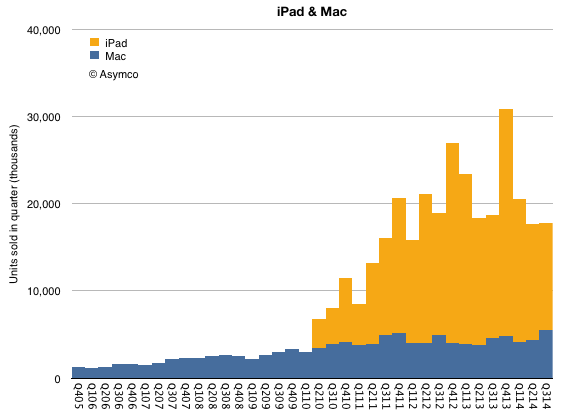
As the chart above shows, even though iPad sales are flat and Mac sales are surging, iPad sales are still, far, far greater than those of the Mac. The Mac is not going to help the notebook and desktop form factors reclaim their once dominant position in computing. Rather, with every passing day, the notebook and the desktop’s total share of the computing pie becomes ever smaller.
Next quarter, Apple will sell its billionth iOS device (around 950m so far) ~ Jan Dawson (@jandawson) 10/20/14
Apple will probably sell more iPhones & iPads this quarter than there are Macs in use (~80m). ~ Benedict Evans (@BenedictEvans) 10/20/14
IDC said worldwide PC shipments for the third quarter of 2014 were 78.5 million, down -1.7% year-over-year. ((IDC had an odd way of reporting this news. They said, “Global PC Shipments Exceed Forecast with Mild Improvement in Consumer Demand”. Translation? The decline wasn’t as bad as they expected it to be. But it was still a decline of 1.7%.))
Would not be surprised if 90 million iOS devices will ship next quarter. ~ Horace Dediu (@asymco) 10/20/14
Let’s try to put the above information in perspective. Last quarter, the desktop and notebook form factor sold 78.5 million units. Next quarter it is likely iOS alone — the minority platform — will outsell the entire PC industry. Add in Android and “other” and it’s no contest.
Apple will pass 1bn cumulative iOS device sold this year. Android will pass 3bn. ~ Benedict Evans (@BenedictEvans) 9/18/14
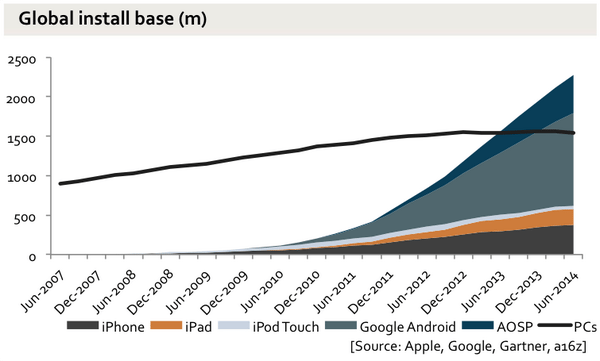
Macs But Not PCs
IMO Mac sales are increasing because Apple is great at leveraging their monopolies. iOS only works with OSX so Mac sales up. ~ Oren Kaufman (@HorhayAtAMD) 10/20/14
Q: WHY ARE MAC SALES RISING WHILE PC SALES ARE FALLING?
I’m certain the “Halo Effect” is a contributing factor to the Mac’s increased sales. The more iOS owners there are, the more likely it is some of them will choose a Mac as their next notebook or desktop computer.
I’m even more certain Apple’s “continuity” feature is going to make Macs ever more attractive to iOS users. The close integration between the iPhone, the iPad and the Mac, makes the Mac a natural choice for many iOS owners.
Having used Continuity, Handoff across MacBook, iPad and iPhone, I can say it’s awesome. I would have expected Microsoft to get there first. ~ Patrick Moorhead (@PatrickMoorhead) 10/23/14
But here is my pet theory as to why the Mac is growing while the PC continues to decline.
In 2006, almost anyone who owned a computer owned a PC. Today, we can choose between a PC and a variety of non-PC computing alternatives, including phones, tablets, Macs, etc. Many people feel little need to upgrade their existing PCs. Others feel no need to own a PC at all.
I still believe the traditional notebook and desktop form factor is overkill for most mainstream consumers. ~ Ben Bajarin
However, many people absolutely and positively need the power and flexibility provided by a notebook or desktop computer. These potential PC buyers differ from those in 2006. In 2006, the PC was (almost) the only game in town, so everybody got a PC. Power users got powerful PCs and people who needed minimal computing power purchased the cheapest PC they could find. Today, people who barely need a PC are opting for phones and tablets instead. That leaves only power PC users as a potential PC buyers.
The power user never has, and never will, buy a cheap PC. They know their computing needs will only be met by powerful computing machines. Here’s the important bit. Many power users are realizing if they’re going to be spending a thousand dollars and more for a computing device, the best PC…is a Mac.
In other words, for the budget conscious, the Mac compares poorly to the budget PC. But to the power conscious, the Mac compares very favorably to the top-of-the-line PC. Macs are a premium product and more and more, the only people buying notebooks and desktops are power users who are shopping for premium computing devices.
[pullquote]Increased Mac sales are not proof the PC form factor is becoming more popular. Rather, it is proof notebooks and desktops are becoming a premium niche[/pullquote]
In my opinion, Mac sales prove the exact opposite of what the “PC-IS-RESURGENT” crowd is contending. Increased Mac sales are not proof the PC form factor is becoming more popular. On the contrary, increased Mac sales are proof the PC form factor is becoming a premium niche.
Post-PC
Maybe we aren’t in a post-PC world. Maybe it’s an also-PC world. ~ Farhad Manjoo (@fmanjoo) 10/20/14
Q: ARE WE IN SOMETHING OTHER THAN A POST-PC WORLD?
No.
If a person as informed and as intelligent as Farhad Manjoo doesn’t know what “Post-PC” means, then I’m guessing most of us don’t understand what the term means either.
The Stone Age did not end because we stopped using stones. The PC era isn’tending because we stopped using PCs. ~ Horace Dediu (@asymco) 10/24/14
Post-PC does not mean the PC goes away. It does not mean we only use phones and tablets to do our computing. It simply means the PC is no longer the center of our computing universe.
“PCs are going to be like trucks,” Jobs said. “They are still going to be around.” However, he said, only “one out of x people will need them.” ~ AllThingsD, 2010
Emphasis added.
Apple has always emphasized the importance of the Mac in the post-PC world. Shortly after taking the reins at Apple, Tim Cook had this to say about the Mac:
[pullquote]As people walk away from the PC, it becomes clear that the Mac is what you want if you want a PC.[/pullquote]
And we haven’t given up on the Mac. A lot of people are throwing in the towel right now on the PC. We’re still spending an enormous amount on really great talent and people on the Macs of the future. And we have some really cool things coming out there. Because we believe as people walk away from the PC, it becomes clear that the Mac is what you want if you want a PC.
Two years later, that statement is looking mighty prescient.
Apple’s position is, whether it be a Mac or an iPad or an iPhone, people should use the right tool for the task at hand. In 2006, we owned one computing device. In 2015, we will own multiple computing devices. Truth be told, we already live in that reality today. Multiple computing devices are the norm not the exception.
Globally, the average connected devices per person is 2. In USA it is 2.8 ~ Ben Bajarin (@BenBajarin) 8/21/14
90% of students in the UK own both a laptop and a smartphone. A further 40% have a tablet computer ~ BBC News
Ironically, it was Bill Gates, in 2007, who predicted the multi-device computing world that we live in today:
Mossberg: What’s your device in five years that you’ll rely on the most?
Gates: I don’t think you’ll have one device.
I think you’ll have a full-screen device that you can carry around and you’ll do dramatically more reading off of that – yeah, I believe in the Tablet form factor…
…and then you’ll have the device that fits in your pocket…
…and then we’ll have the evolution of the portable machine. And the evolution of the phone will both be extremely high volume, complementary–that is, if you own one, you’re more likely to own the other.
Now tell me, does that sound like the vision embodied by Microsoft’s 2-in-1 Surface ((If you think the Surface is doing well, you need to read this article by Mark Rogowsky and look at this chart by Jan Dawson.
—
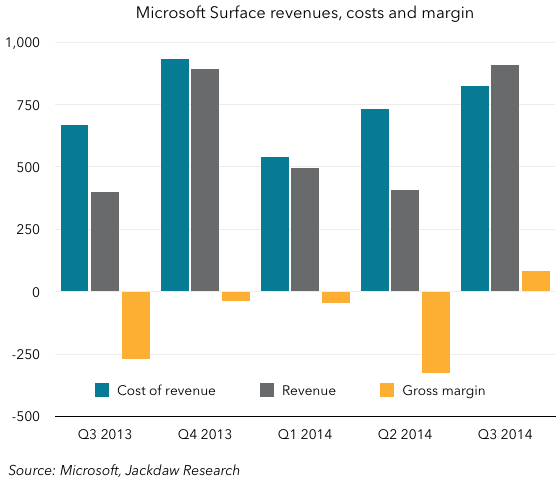
—
Source: THOUGHTS ON MICROSOFT’S Q3 2014 EARNINGS)) computer or does that sound more like the vision embodied by Apple’s iPhone, iPad, and Mac portfolio of computing devices? (And don’t forget the upcoming Apple Watch, either.)
To be honest, I don’t much care what your opinion is. The market is the only opinion that matters and the market has emphatically expressed its opinion by overwhelmingly voting for multiple devices. If you don’t think multi-device is the direction computing should be taking, argue with the market, not me.
Conclusion
I believe as we move further and further into the post-PC (or multi-computing device) era, two things are going to happen.
First, the base number of notebook and desktop computers will remain at, or near, current levels. However, the form factor’s overall share of the total number of personal computing devices will continue to shrink as phones and tablets rapidly spread across the globe.
Second, those who need less computing power will eschew the notebook and desktop form factor. Those who need the form factor, but eschew the power and complexity, will gravitate toward devices like the Chromebook. And those who need both the form factor and the power it embodies, will move towards Macs.
What was unthinkable only ten years ago is happening. The traditional Windows PC is being squeezed by Chromebooks from below and by Macs from above and is rapidly moving from monopoly to minority status. The Mac on the other hand is emerging from the shadow of the Windows PC and, among power users, is taking its place as the majority player. ((26.8% of the notebooks and desktops sold in the U.S. between July 4th and September 1st were Macs.))
